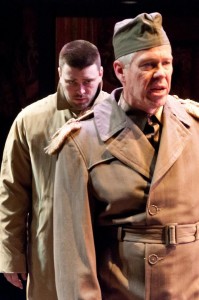Troilus and Cressida by William Shakespeare, Actors’ Shakespeare Project, The Modern Theatre, 4/25/12-5/20/12, http://www.actorsshakespeareproject.org/events/troilus-and-cressida-0.
Reviewed by Craig Idlebrook
(Boston, MA) There are two major ways to connect audiences to Shakespeare, despite the tricky language: you can glitz up the production so theatergoers don’t realize their brains are doing heavy-lifting (a la Baz Luhrmann’s seizure-inducing Romeo and Juliet) or make sure you serve up quality and let the script speak for itself. Tina Packer consistently has chosen the second option in her body of work. She knows she’s got a good thing in Shakespeare and she wants to share the beauty of the prose, even if it means losing a few theatergoers along the way.
Packer doesn’t sway from this brave philosophy with the Actors’ Shakespeare Project of Troilus and Cressida. This Trojan War-era meditation of a play lacks any ounce of froth, and it largely is avoided by most companies. One can see why; it’s almost like the Seinfeld of Shakespearean dramas in that little actually happens.
Plot? Eh. Okay. During a stalemate between the Greeks and the Trojans over the bragging rights of the beautiful Helen, Greek military leaders are searching for answers as to why they haven’t yet wiped the floor with the Trojans. They decide it’s all the fault of morale, specifically caused by the hero Achilles, who seems idled and insolent. They decide to put him in his place.
Oh wait, this play is actually about a pair of lovers, the title characters, who decide to fall for each other, despite that one is a Greek and one is a Trojan. That’s what this play is about.
Except we lose focus on them, as well, and deal with the Trojans, who are getting a bit uneasy about the increasingly loud wails of the prophesizing Cassandra, who predicts they are headed for trouble.
Except it’s about all three of these things, and we never gain any traction on any one plot. Instead, we’re left with a rather large cast of characters who talk too much.
Despite this mediocre script, Packer forges a heartbeat of a theme that binds these folks. The Greeks and Trojans are all struggling and dying for intangible pride, which, it is argued, is all that makes life worth living. Yet pride is this unattainable golden suit of armor hanging over their heads, never reachable, but always worth the effort.
Despite Packer’s best efforts, all but the most learned theatergoer can get bogged down in the discussions and subplots. And she doesn’t leave much of a trail of breadcrumbs, choosing a minimal set and costume design that creates a nihilistic world from an undefined era.
While in the midst of a terrible season with the Seattle Mariners, Japanese baseball player Ichiro Suzuki admitted that one had to focus on individual achievements to stay motivated. Theatergoers might need to do the same during the driest parts of this play. Luckily, there is plenty of good going on to catch the eye. Robert Walsh is fantastic double-casted as the over-the-top Trojan pimp Pandarus and the Greek commander-in-chief Agamemnon. Walsh is able to swing from the frenetic energy of Dean Stockwell to the stoic immovability of Lee Marvin in mere seconds. I also longed for more stage-time for Ross MacDonald, who plays the Trojan Hector. One can watch the absurdity of honor in his nicely-underplayed mood-swings, as Hector challenges the Greeks to deadly battle and then embraces their offer for a night of drinking a few seconds later.
Also worth the price of admission is the skilled swordplay and fisticuffs choreographed by Ted Hewlett, who gets the badass title of “violence designer” in the program. Try putting that down on a resume and see if it stands out from the slush pile.
It’s clear this production is high-quality, but it’s harder to determine if it’s good, and the fault lies squarely with a certain playwright who can’t seem to make up his mind. This play is worth watching, however, if only to witness a dedicated band of theater professionals make something manageable out of unwieldy material.

